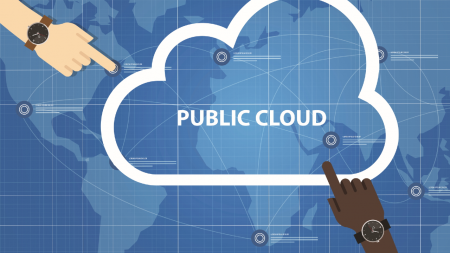The migration to the cloud is happening at a tremendous pace. Putting an adoption framework in place becomes a critical need for business in order to be successful. However, this is not a simple task and requires a team effort, risk mitigation, and governance policies.
Search Results: data cloud (4645)
Looking at ways to improve cloud security remains a top priority for businesses. IBM Security recently announced a plan to use Amazon Web Services (AWS) to enhance cloud infrastructure security for hybrid environments.
The day we thought would never arrive —the end of 2020!!— is here and I’d like to share my choices for the Top 10 Cloud Wars stories of 2020.
Oracle and its fast-growing IaaS business face a very different challenge, as chairman Larry Ellison says demand is far outstripping supply.
Oracle claims that its Autonomous Data Warehouse has three significant advantages over category-king Amazon and shiny new object Snowflake.
Honeywell looks to use its 114 years of industrial and process-control expertise to build the world’s premiere industrial-software company.
Thomas Kurian raised the specter that proprietary clouds won’t meet the “survivability requirements” of today’s hybrid and multicloud world.
The three vendors whose cloud revenue is growing most rapidly are Google at 44.8%, Oracle 33% (estimated), and Microsoft 31%.
Guest author Jiri Kram explores what Larry Ellison’s unexpected frontal attack on Salesforce could mean for AWS.
If Google’s founders have a secret list of “best hires we’ve ever made,” I would bet Google Cloud CEO Thomas Kurian is near or at the top.
Surging growth and massive potential have spurred Alphabet to break out the financial results of Google Cloud in a separate reporting segment.
PowerGP Online takes your Dynamics GP to the cloud – but it also provides you with a new arsenal of custom-built modules that enhance your GP experience. Learn about how to best use these complimentary, PowerGP Online exclusives to bring added ease and robust capabilities to your daily processes.
The decision to move your mission-critical business applications to the cloud is no longer IF but WHEN. Chances are you’re already successfully running applications in the cloud today. Cloud-based payroll, HR benefits, marketing automation and email are amongst the many available solutions that companies have been managing online for years. Historically companies hesitated to move business applications like GP, SL, NAV, AX and CRM to the cloud, but to stay competitive and drive business continuity, the time to migrate is now.
Regardless of your company size or industry, recent events have shown us how important moving to the cloud is for all businesses. As companies went to being fully remote for months, some found that their on-premises solutions could not accommodate a virtual work force and caused unnecessary problems with day-to-day operations. Real-time secure access to data, regular back up provisions, remote access for all users are just some of the cloud benefits.
In this session, learn best practices on how building an effective migration strategy and plan will support a successful move to the cloud and help maximize your business application investments.
Now, more than ever, you need efficient processes to get packages delivered to your customers’ docks and doorsteps. In this session, you’ll learn about how the Blue Horseshoe Supply Chain Cloud works with D365 to help you:
•Use D365 data to connect directly with top parcel carriers like USPS, UPS, and FedEx to get accurate shipping estimates, generate carrier compliant labels, and more.
•Manage asset movement and freight handling across your logistic network including equipment, drivers, dispatch, and settlement.
•Optimize routes, save fuel, and increase driver efficiency.
You’ll also learn how D365 and Supply Chain Cloud helps you build a digital supply chain while giving you a control tower view of your warehouse and logistics operations.
Now more than ever it is crucial to make use of the technology readily available to help keep your business productive and competitive. Today, organizations can leverage near real-time business intelligence (BI) to make data-driven decisions to drive better business outcomes, collaborate more efficiently and empower all users become data heroes.
No X-ray vision needed; Power BI enables organizations to connect to and visualize data using one unified, scalable platform which allows you to see your data through a single pane of glass.
Uncover hidden data insights through readable charts and powerful dashboards. Create accurate forecasts, fine-tune operations, become more agile and responsive, all while maximizing efficiencies in ways that simply weren’t possible in the past. If you’re not putting those analytic models to work for your business, you may be missing potential opportunities to improve cash flow and become more competitive.
During this session we will show you how to utilize powerful end-to-end business solutions by connecting cloud computing, Microsoft Power BI and Dynamics AX/F&O to transform your business.
EDI is mission critical for many companies moving to D365 Finance & Supply Chain Management. And the smart companies are seeing why their EDI choice can help their implementations succeed.
During this session you will learn:
1.How to minimize impact on your trading partners while you go through an ERP change.
2.How to avoid D365 software customization for EDI and stay up to date with regular Microsoft D365 updates.
3.How to leverage your EDI solution to validate the data migration.
4.See a working integrated EDI solution in action.
We will end the session with a Q&A with our VP’s of Operations & Technology.
EDI is mission critical for many companies moving to D365 Business Central. And the smart companies are seeing why their EDI choice can help their implementations succeed.
During this session you will learn:
1.How to minimize impact on your trading partners while you go through an ERP change.
2.How to avoid D365 software customization for EDI and stay up to date with regular Microsoft D365 updates.
3.How to leverage your EDI solution to validate the data migration.
4.See a working integrated EDI solution in action.
We will end the session with a Q&A with our VP’s of Operations & Technology.
Anthony Brooks-Williams and I discuss how HVR takes hybrid cloud to the next level, providing data-replication and data-integration solutions.
The surging and superior results from Amazon’s “traditional” businesses might provide Bezos with the impetus to spin out AWS next year.
Google Cloud retained its claim to being the fastest-growing cloud vendor by boosting its revenue 44.8% in Q3.





















